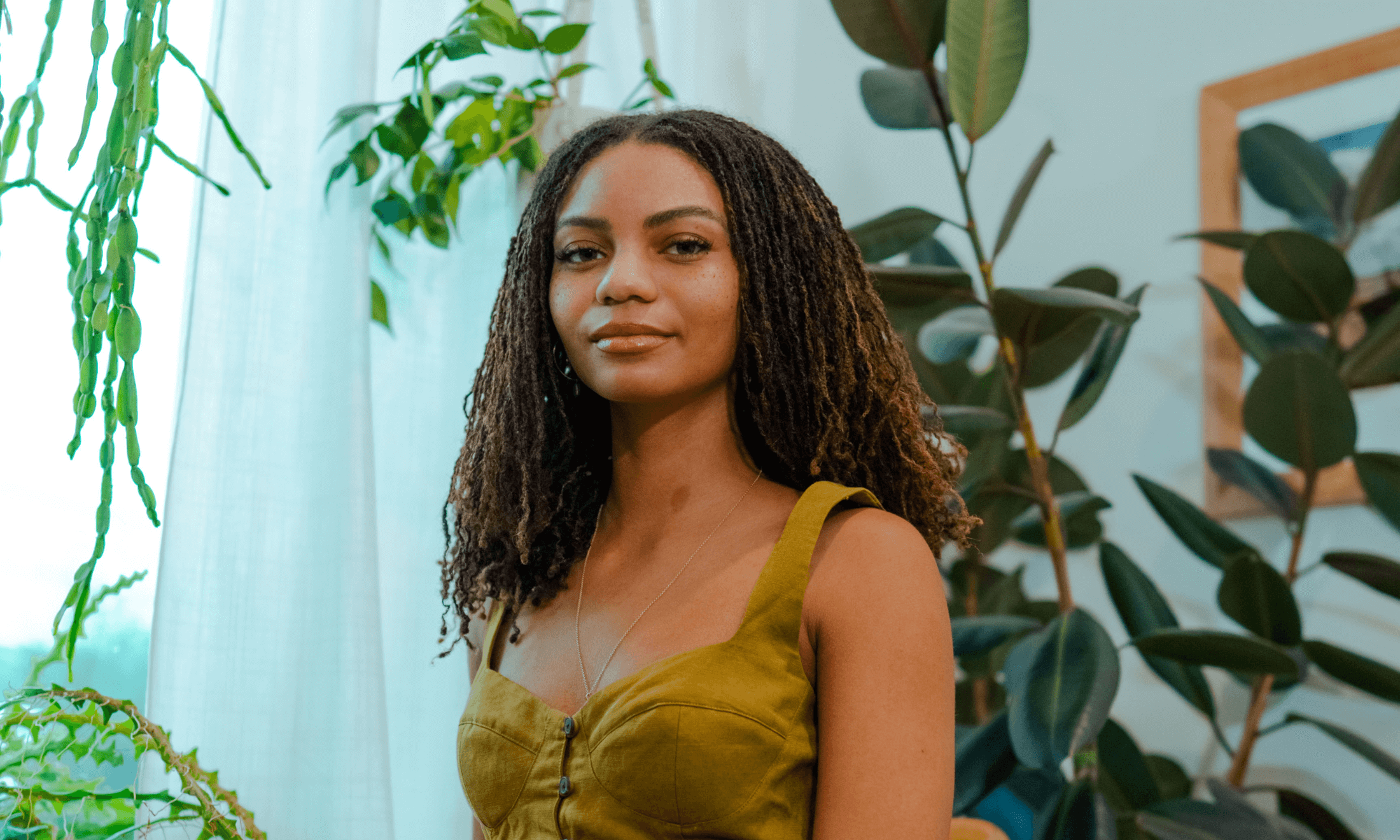
Val Vega
Leah Thomas is building a generation of intersectional environmentalists
We meet the climate activist to discuss her new book and the importance of community-building.
Shannon Lee and Editors
31 Oct 2022
When racial justice infographics proliferated on social media in the spring of 2020, activist Leah Thomas felt it was the perfect time to bring up the intersection between environmentalism and anti-racism. Her viral post titled ‘Environmentalists For Black Lives Matter’ explained the concept of and need for environmentalism that was intersectional in its approach, recognising how marginalised groups have been disproportionately affected by the climate crisis.
“I was working in the environmental space at the time and felt like there was a disconnect or knowledge barrier,” Thomas tells gal-dem from her home in southern California. “People saw racial justice as a separate issue from environmental issues. I wanted to create an accessible way to help people understand why things like racial, disability, class and gender justice should also be included within the environmental conversation.”
Raised in Missouri, Thomas moved to California to attend Chapman University where she majored in Environmental Science and Policy. “I was always in love with STEM, particularly ecosystems and ecology,” she says. While her main focus was science, Thomas credits her minor in comparative world religions for inspiring an interest in identity. She became fascinated with discovering how spiritual practices around the world are rooted in some form of devotion to the natural world. In her free time, she puts that bond between spirituality and the environment into practice by writing poems about nature. “[They’re] probably nothing I’ll ever share publicly,” says Thomas. “But I like romantically thinking about nature. It helps you fall in love with all the ecosystems.”
After graduating, Thomas decided to invest her time into intersectional environmentalism. Within a week, a separate website and an Instagram handle (@intersectionalenvironmentalism) were created. Today, it is a global non-profit collective that develops educational content, resources, and vital programming. “I remember us thinking, ‘when will there be another point in history where there are thousands of people eager and ready to learn about environmental science and justice and diversity?’”
“Our identities flow through our politics, our advocacy, what we care about — whether we realise it or not”
Leah Thomas
Two years following her viral Instagram post, the 27-year-old is celebrating the release of her first book, The Intersectional Environmentalist. Operating as a foundational text, the publication is a guide to the movement written in a series of digestible, joyful chapters. “I once thought I had to choose between advocating for my Black identity and the planet, but now I know better,” writes Thomas in the introduction. “You never have to silence parts of your identity or force them to take a back seat to advance a cause. Our identities flow through our politics, our advocacy, what we care about — whether we realise it or not.”
In the spirit of inclusion, the book features essays and excerpts by fellow activists in the space from around the world, including Kāi Tahu Indigenous and disability rights activist Nā Kera Sherwood-O’Regan; Philippines-based climate organiser, Beatrice Tulagan; Berlin-based Black feminist Sheena Anderson; the founder of Latino Outdoors, José González and many more. “I wanted to write this and include all the people who were central to this movement so that they can’t write us out,” says Thomas. “I’m not going to let them take our voices away.”
The Intersectional Environmentalist builds on the 17 Principles of Environmental Justice, drafted and adopted in 1991 at the National People of Color Environmental Leadership Summit. The book expands on these foundations by providing a global lens to ever-evolving ecological challenges. Thomas cites environmental justice case studies that show how different communities of colour are impacted by environmental racism today.
For example, according to a 2018 study published by the American Public Health Association, 43% of African Americans live in urban “heat islands” without access to green spaces. The same study also showed that people living in tribal communities in the US are impacted by asthma at nearly double the national average rate due to poor air quality. It also found that, compared to other racial groups, Chinese and Korean Americans have the highest mean cancer risk due to air pollution exposure.
Meanwhile, a 2019 study published by Union of Concerned Scientists found that, in California, Latine people are exposed to 39% higher levels of air pollution compared to white communities.
“I do it for the head-nod moments, which is why it was so important for me to bring a diversity of voices [into the book], so other women of colour could also have that experience”
Leah Thomas
According to Thomas, while environmental justice establishes the policies and the data, intersectional environmentalism establishes the culture and framework needed to tackle the climate crisis. “Through environmental justice research, we’ve been able to see how racism and income are often compounding factors and big determinants as to whether or not, for example, people will live with toxic waste in their neighbourhood,” Thomas explains. “Intersectional environmentalism raises awareness about environmental justice while also celebrating the ways different cultures and traditions embody these principles.”
The Intersectional Environmentalist collective hosts Earth Sessions, a series of community-driven environmental justice concerts several times a year. Their most recent event, which took place on 16 October 2022 in San Francisco, featured a meditation and acoustic performance by the artist-activist, Raveena, along with a panel discussion and community-building workshop. They also organised the first-ever Black EcoFeminist Summit, which took place in London on 2 October 2022. The event brought together Black women environmentalists from the African and Caribbean diasporas in a safe forum for healing, joy, and community; a place to be seen, heard, and celebrated. Tickets to the free summit were sold out almost immediately, demonstrating how necessary and rare these spaces are. It included guided meditations by Extinction Rebellion’s Daze Aghaji; free books provided by the Black Feminist Bookshop; a joy-building exercise with climate justice activist Mikaela Loach; and a fireside chat between Thomas and the multi-disciplinary storyteller Whitney Richardson.
“I do much of my work for Black women,” says Thomas. In writing The Intersectional Environmentalist, she consciously decided to include this perspective front and centre. “When you read this book, it’s evident that I’m a Black woman, and I’m writing this a little bit extra for all the Black girls out there,” she shares. “I do it for the head-nod moments, which is why it was so important for me to bring a diversity of voices [into the book], so other women of colour could also have that experience.” Growing up and being educated under environmentalism that celebrated the contributions of white people almost exclusively, Thomas looks forward to seeing copies of The Intersectional Environmentalist in colleges, to inspire students worldwide.
More recently, Thomas has been delving into more specific themes within intersectional environmentalism. “Many people are pretty familiar with the basics,” she explains. “Now we’re seeing a thirst for more. People are curious about niche topics like environmentalism and labour movements, queer ecology, etc.” Currently, she is working on a proposal for a second book that focuses on ecofeminism. “It’ll still be super accessible,” she reassures. “But it will examine how and why women are so often burdened with the task of saving the planet.”
The Intersectional Environmentalist: How to Dismantle Systems of Oppression to Protect People + Planet is published by Souvenir Press.

Britain’s policing was built on racism. Abolition is unavoidable

How Pakistan’s Khwaja Sira and transgender communities are fearing and fighting for their futures

Their anti-rape performance went viral globally. Now what?






